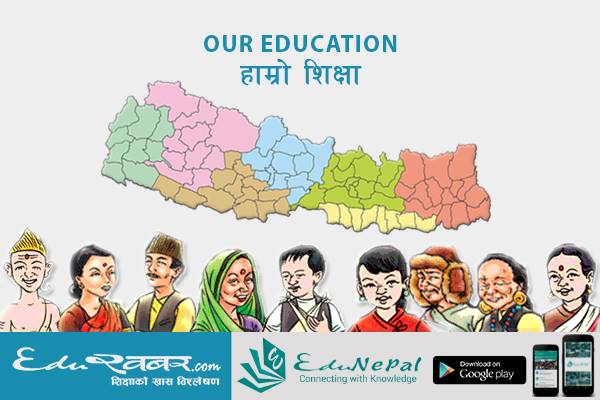
In all provinces other than province number two, local bodies have now taken over their task of oversight of the public schools up to the secondary level. However, teachers say that the elected representatives should find out the cause of deteriorating quality of education at public schools and motivate them for good results. They say it is not time for blame game but an opportunity to retrospect. Officials at the local government say they plan to increase monitoring of all stakeholders including schools, teachers and students.
Kavre - Ram Krishna Thapa is a teacher at a community school in Banepa, a town in Kavre district. He is optimistic that the transfer of power to local bodies for overseeing public education till the secondary level will yield a positive outcome.
He says, "In the past central authroities would formulate policies for schools but now the power has been transferred in the hands of the local bodies. I am confident that there will now be improvement in public education."
Thapa is not alone. Rishi Humagain, a Nepali teacher, at Gangadevi High School in Banepa is happy about local bodies directly looking into the public education.
He says, "Now the local governments should award those who do best in their jobs and punish those who fail to discharge their duties. The government can motivate teachers in various like providing special discount to them in local hospitals or establishing a separate teacher's hospital for them among others."
With elected representatives taking the charge of basic education at local bodies, both Thapa and Humagain, who are the local residents of Banepa, are expecting reforms in education. They say local bodies should focus on programmes that motivate teachers if they want the quality of education to improve.
Local intellectuals say the communities have now higher expectation from teachers. Rajbhai Manandhar, a former principal of Chaitanya High School, says, "We have been hearing complains for a long time that there has been no reform in education. Now there is an opportunity to make real reforms. We can cash this opportunity by motivating teachers."
Manandhar, who has three decades of teaching experience, says targeting teachers for degrading quality of public education has frustrated many teachers who are genuinely contributing for better education. He says the local bodies should now identify the causes of poor performance of public schools and take steps to motivate the teachers.
Experts say it requires open and frank discussion on what steps the elected local governments can take to motivate the teachers. However, they also argue that if the local governments don't opt any such policy than there would be no direct difference of the handover of the central powers to the local governments regarding the management of public education in the ground.
They say that the local bodies can honor teachers whose students bring good grades on his/her subjects. In addition to this, long term programmes targeting their health and well being can also be other option. Experts suggest that the government should also unveil policies to encourage teachers to enroll their students in public schools.
Apart from this, they also suggest the government to disburse salaries to teachers on monthly basis by amending the existing provision of making payments every quarter. Nirmala Raut, a teacher says, "Other government employees receive their salary every month however we are being paid once in four months. Many teachers are sad from this. If the local bodies resolve this problem, it would not be hard to make reforms in education."
Both schools and students are being caught in the blame game by different stakeholders regarding the poor quality of education in community schools. Teacher Ram Krishna Thapa says politicisation on education is the root cause of the problem. "Most of the schools have failed because they are looking for politically loyal teachers rather than qualitative ones. This has frustrated ones who want to do better in their profession. We should strongly discourage such type of appointments."
Another teacher Rajesh Yadav also blames political intervention for growing frustration among teachers. "There are tussles and conflict everyday which will diminish the quality of education," he adds.
Mayor of Banepa Municipality Laxmi Narshing Bade says they are aware of the importance of motivating the teachers. He said the difference in the Nepali medium and the English medium school education is one of the major factor for disappointment for teachers.
"The community schools should impart education in English medium like the private schools. They have capable and efficient teachers. We should create an atmosphere to utilize their capabilities," he added.
He further said better teaching environment would be created to motivate teachers and then their activities would be monitored by the municipality.
his story based on radio programme entitled 'Hamro Sikshya' which discusses the opportunities and challenges in public education in the new federal setup. The programme is produced by edukhabar.com with the support of Action Aid Nepal. The radio programme can also be tuned through this link: http://www.edukhabar.com/audio/35 and also through aneroid app Edunepal.
प्रतिक्रिया